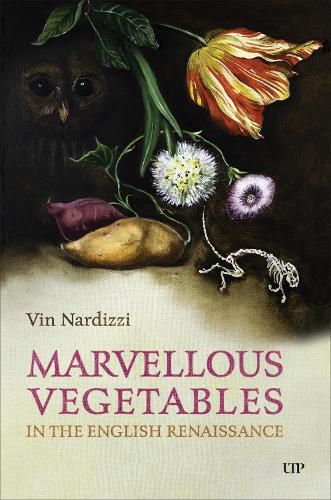Readings Newsletter
Become a Readings Member to make your shopping experience even easier.
Sign in or sign up for free!
You’re not far away from qualifying for FREE standard shipping within Australia
You’ve qualified for FREE standard shipping within Australia
The cart is loading…






John Gerard's natural history of plants, The Herball (1597), is considered a failure in the history of science. Despite this reputation, it has endured as an aesthetic resource. Its illustrations were used as needlework patterns, and strewn across its pages are extracts of classical poetry, including Ovid's Metamorphoses, that delight and instruct. It is little wonder that early modern poets, like Shakespeare and Milton, gathered inspiration from this storehouse of plants.
In Marvellous Vegetables in the English Renaissance, Vin Nardizzi offers a reparative reading of Gerard's "failed" text, particularly its chapters on leeks, laurels, tulips, and potatoes. Through a series of experiments in speculative natural history, which require an analysis of both word and image, Nardizzi distills The Herball's logic and poetics, its distinctions and infelicities, and demonstrates the entanglements of humans and plants at the core of Shakespeare's plays. Exploring these "cross-kingdom" encounters, Nardizzi contributes to the burgeoning field of queer ecologies by treating plant natural history as a serious intellectual resource for writing a counter-history of embodiment at the turn of the seventeenth century. All we need do, Nardizzi proposes, is smell the flowers.
$9.00 standard shipping within Australia
FREE standard shipping within Australia for orders over $100.00
Express & International shipping calculated at checkout
John Gerard's natural history of plants, The Herball (1597), is considered a failure in the history of science. Despite this reputation, it has endured as an aesthetic resource. Its illustrations were used as needlework patterns, and strewn across its pages are extracts of classical poetry, including Ovid's Metamorphoses, that delight and instruct. It is little wonder that early modern poets, like Shakespeare and Milton, gathered inspiration from this storehouse of plants.
In Marvellous Vegetables in the English Renaissance, Vin Nardizzi offers a reparative reading of Gerard's "failed" text, particularly its chapters on leeks, laurels, tulips, and potatoes. Through a series of experiments in speculative natural history, which require an analysis of both word and image, Nardizzi distills The Herball's logic and poetics, its distinctions and infelicities, and demonstrates the entanglements of humans and plants at the core of Shakespeare's plays. Exploring these "cross-kingdom" encounters, Nardizzi contributes to the burgeoning field of queer ecologies by treating plant natural history as a serious intellectual resource for writing a counter-history of embodiment at the turn of the seventeenth century. All we need do, Nardizzi proposes, is smell the flowers.